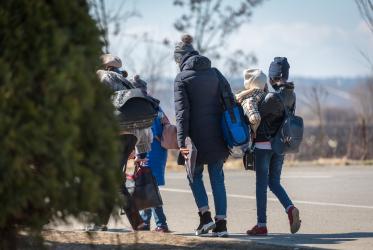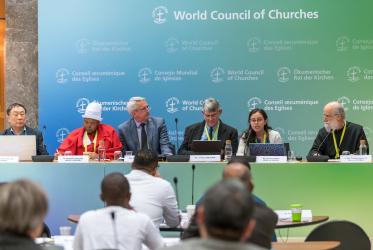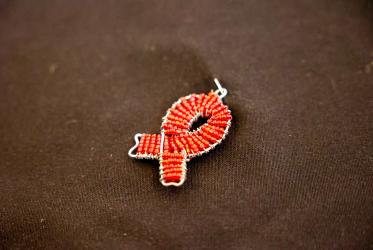Bangkok, Thailand
20 - 25 November 2003
One hundred and forty seven participants representing Buddhists, Christians, Hindus and Muslims, met in Bangkok for the Inter Faith AIDS Conference - For We Are Neighbors.'
Religions and faiths are different roads converging to the same goal - service to humanity. In spite of different beliefs, we all have one common platform: A fundamental belief and respect for the unique human value, human dignity and human rights.
HIV is a critical test for our faith and our commitment to building a sustainable community and a fullness of life since HIV is rooted not merely in health and physical sphere but also in life styles, social perspectives, attitudes and individual behavior practices.
As religious communities, we believe that HIV/AIDS is not a form of punishment for the sufferer but an opportunity for us to serve the sufferer. Through this, our religious communities have been challenged by our faith and divine teaching against stigmatization and discrimination. We should therefore focus on the teachings common to all religions: Love, compassionate service and mercy. The HIV/AIDS crisis is an opportunity to mobilize our concern for the fullness of life for those among us who are infected or affected.
The HIV/AIDS crisis has brought us together. We need to share knowledge, understanding and experience from our various religious communities so that our efforts become more and more effective. Through this, we unite as a global community to establish a new culture of interfaith co-operation, which will balance the individual interest of our religions with the interest of our societies while focusing on our common values of human dignity and human rights.
It is our common understanding that:
-
All humans are equal. We are brothers and sisters. Thus, we should treat each other with mutual care and respect regardless of social status, faith, gender or life style.
-
We should speak openly about the basic facts of the HIV/AIDS crisis and about all effective means of prevention.
-
Individuals in our communities are facing unprecedented pressure due to globalization and industrialization.
-
The root causes of the HIV/AIDS crisis include gender inequality, systemic injustice and unequal distribution of wealth. Our approaches therefore have to be sensitive to the various effects, our efforts will have for women, men, children, adults, rich and poor etc.
-
Young people are especially vulnerable to the HIV/AIDS crisis. We, as religious communities, must therefore provide genuine concern, guidance and support for survival and well being of the future generation.
-
We stand united with those who are living with the virus, those who mourn and those who are dying together with their families and communities.
-
We pledge to serve and nurture the children of those who have been infected and affected by HIV/AIDS.
-
We need to end the silence of stigma, denial and fear about HIV/AIDS and practically embrace those who have become victims of our ignorance and apathy.
-
We have to dedicate expanded resources to the fight against the HIV/AIDS crisis.
-
Medication, treatment and support must be made available for all who need it. It is the responsibility of each and every government, multilateral institutions, the pharmaceutical industry and other international bodies.
-
Continuous medical research must be given priority. Scientists and research institutes must be encouraged to invent more effective methods of prevention and treatment.
-
The HIV/AIDS crisis is the sum of multiple life dimensions: The spirit, the mind and the environment has to be understood in a local, national and global context.
We now call upon all our sisters and brothers to develop a new culture of interfaith co-operation to fight the global HIV/AIDS crisis and its consequences. HIV/AIDS knows no boundaries and therefore, all of our religious communities are living with HIV/AIDS. We admit and regret that many religious communities and governments have been slow in reacting to the crisis, with the result that those among us who are living with HIV/AIDS have not always been met with the solidarity and support they deserve. This must change immediately. It is high time to act now.
At the same time, we call upon all political leaders to spare no efforts in the fight against the HIV/AIDS crisis and its consequences. No political, financial or ideological interests must ever be allowed to over-shadow the protection of human value, human dignity and human rights. We also call upon all those who take leadership at the global, national and local levels to fight against the HIV/AIDS crisis and to recognize the role of faith based communities in this fight, and be open to co-operation and dialogue in order to make our common struggle as efficient as possible.
Most importantly:
We call upon all advocates in the fight against the HIV/AIDS crisis, including religious communities, political leaders and governments, to actively involve people infected with and affected by HIV/AIDS in all aspects of the fight against the HIV/AIDS crisis. Those who are infected and those who are affected have first hand knowledge about the situation, and therefore represent an invaluable source of competence that is desperately needed to make the fight succeed.
Christian Conference of Asia, World Council of Churches, Christian Aid, Norwegian Church Aid, United Evangelical Mission, Church of Christ in Thailand AIDS Ministry and Ecumenical Coalition on Tourism





